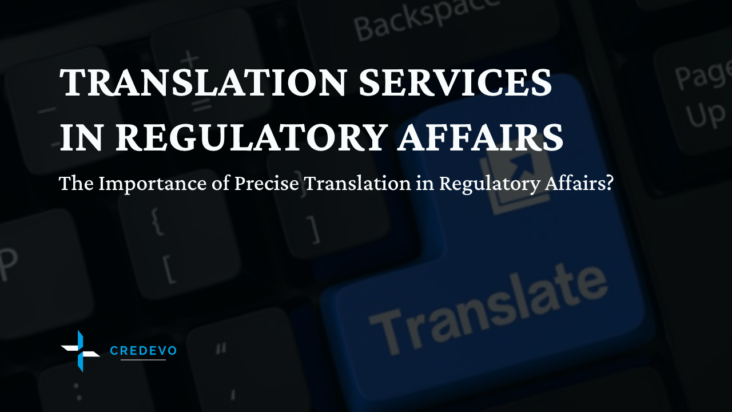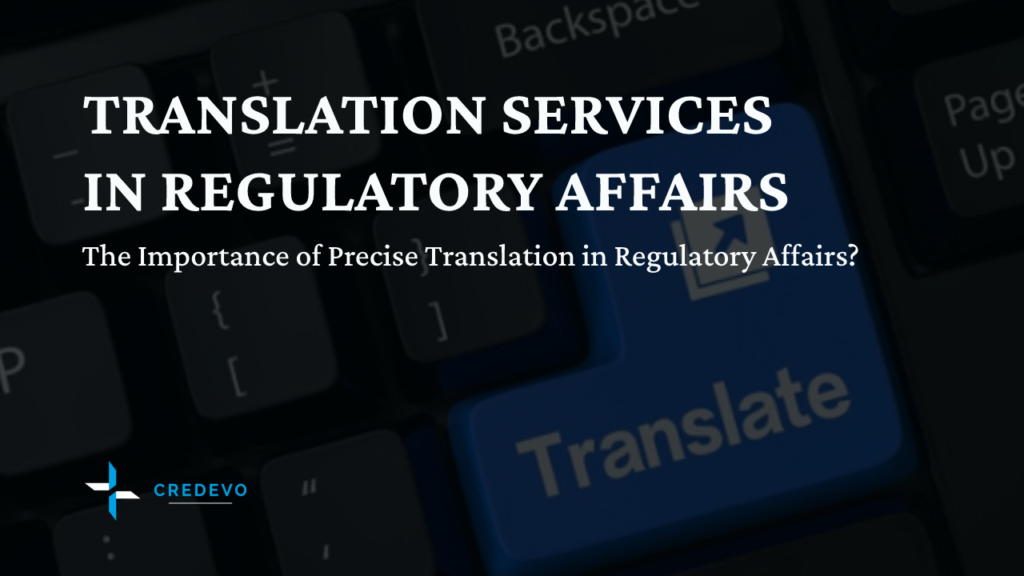The Importance Of Precise Translation In Regulatory Affairs

In the pharmaceutical industry, regulatory affairs and translation are critical. Regulatory affairs encompass the procedures and actions to ensure compliance with safety, efficacy, and quality standards set forth by relevant authorities for pharmaceutical products.

Translation, on the other hand, refers to the accurate translation of regulatory documents, product labels, and instructions, from one language to another.
Effective communication is vital in the pharmaceutical industry, and translation helps ensure that important information is accessible to all stakeholders, including patients, healthcare providers, and regulatory authorities.
Regulatory affairs and translation are closely intertwined, as regulatory compliance requires accurate and timely communication of information in multiple languages.
The importance of accurate translation in regulatory affairs
- Accurate translation is of utmost importance in regulatory affairs within the pharmaceutical industry. Regulatory documents, such as clinical trial reports, product labeling, and instructions for use, must be accurately translated.
- This is to ensure that they are understandable and accessible to all relevant stakeholders, regardless of their language or cultural background.
- Failure to accurately translate such documents can lead to serious consequences, including delays in the regulatory approval process, legal and financial penalties, and, most importantly, risks to patient safety.
- Moreover, regulatory authorities require that pharmaceutical companies submit documents in multiple languages, which can be challenging given the complex and technical nature of the information.
- The accurate translation preserves the intended meaning of these documents and provides all stakeholders with access to the information necessary for making informed decisions about the safety and efficacy of pharmaceutical products.
Common challenges and risks associated with inaccurate translations in regulatory affairs
- Inaccurate translations can compromise patient safety.
- Regulatory authorities may reject applications or delay approvals if translations are not accurate, complete, and consistent.
- Inaccurate translations can damage a company’s reputation and credibility.
- Legal implications may arise from inaccurate translations, such as lawsuits and fines.
- Risks associated with inaccurate translations can have severe consequences for patients, pharmaceutical companies, and the industry as a whole.
Case studies/examples of inaccurate translations and their consequences in regulatory affairs
Examples of inaccurate translations in regulatory affairs:
- A pharmaceutical company submitted a translation of a clinical study report that erroneously stated no adverse events had been reported.
- Inaccurate translation resulted in drug approval but several patients subsequently experienced serious side effects
- Mistranslation of product labeling for a medication resulted in incorrect dosage recommendations and patients overdosing.
- Inaccurate translation in this case resulted in significant financial losses for the pharmaceutical company, lawsuits, and loss of reputation.
- Inaccurate translations of informed consent forms in clinical trials have led to misunderstandings among study participants, potentially putting them at risk.
Importance of accurate translations in regulatory affairs:
- Demonstrates potential consequences of errors in translations in the pharmaceutical industry
- Accurate translations are crucial for ensuring patient safety, regulatory compliance, and successful market entry for pharmaceutical products.
Best practices for ensuring accurate translations in regulatory affairs
To ensure accurate translations in regulatory affairs within the pharmaceutical industry, there are several best practices that companies can follow. These include:
Partner with professional translation services
Working with professional translation services can ensure accurate translations of regulatory documents, as they have expertise in technical language and regulatory compliance. They can also provide quality assurance measures such as editing and proofreading to ensure accuracy.
Use native-speaking translators
Translators who are native speakers of the target language can provide context and cultural nuances that non-native speakers may miss. By understanding the subtleties and complexities of the language, they are better equipped to ensure accurate translations.
Establish a glossary of terms
Creating a glossary of key terms used in regulatory documents can ensure consistency and accuracy in translations. This ensures that technical terms are translated consistently and appropriately throughout the document.
Use translation memory tools
Translation memory tools can ensure consistency and reduce errors in translations by storing translations of previously translated content. This can save time and ensure consistency across multiple documents.
Implement a review process
Establishing a review process that involves subject matter experts, translators, and editors can ensure that translations are accurate, complete, and consistent. This review process can catch errors, mistranslations, and inconsistencies in the translation.
The role of technology in improving accuracy and efficiency in translation for regulatory affairs
Technology plays an increasingly important role in improving accuracy and efficiency in translation for regulatory affairs within the pharmaceutical industry. Some of the ways in which technology can help include:
Translation memory tools
By allowing the storage and reuse of previously translated content, these tools save time and ensure consistency across documents.
Machine translation
Machine translation can provide a quick and cost-effective way to translate large volumes of text, though it may require human review for accuracy.
Terminology management software
These tools help manage technical terminology across languages and ensure consistency in translations.
Artificial intelligence (AI)
AI-powered translation tools can analyze large volumes of text, identify patterns, and improve the accuracy and efficiency of translations.
Cloud-based translation platforms
Cloud-based translation platforms allow for real-time collaboration and review, as well as provide translation memory and terminology management features.
While technology can certainly improve the accuracy and efficiency of translations in regulatory affairs, it is important to note that human oversight and review are still necessary to ensure accuracy and to catch errors that technology may miss.
Furthermore, regulatory affairs require a high level of accuracy, so it is important to select the right technology and processes that will produce high-quality translations that meet regulatory requirements.
The Impact of cultural nuances and Regional Variations on regulatory affairs translations
- Cultural nuances and regional variations can impact translations in regulatory affairs within the pharmaceutical industry.
- Interpretation and translation of technical terms, idioms, and expressions can be affected by cultural differences and regional variations, leading to inaccuracies in translations.
- Translators must have an in-depth understanding of local regulatory requirements, language, and culture.
- Knowledge of specific regulations or guidelines unique to the region or country where the drug is being marketed is essential.
- Differences in the way clinical trial data is collected and reported across different regions can lead to variations in the language used in clinical trial documents.
- Translators need to accurately convey the intended meaning of clinical trial documents despite any variations in language.
- Product labeling, including instructions for use, warnings, and precautions, needs to be translated accurately, keeping in mind the cultural context and regional variations.
- Translators need to consider the appropriate level of language and tone to use in the translation based on the target audience.
- Taking into account cultural nuances and regional variations helps ensure regulatory compliance and accuracy in translations.
The importance of selecting qualified and experienced translators for regulatory affairs
- The accuracy and quality of translations in regulatory affairs are critical to the safety and efficacy of pharmaceutical products.
- Selecting qualified and experienced translators is crucial for ensuring accurate translations that comply with local regulatory requirements and convey the intended meaning of the original text.
- Translators with expertise in the pharmaceutical industry and knowledge of local regulations are better equipped to handle the specific language and terminology used in regulatory documents.
- Experienced translators have the ability to identify errors and inconsistencies in the source text and offer suggestions for improvement.
- It is essential to select translators who have received proper training and education in translation, including relevant certifications or degrees.
- Translators who have experience working with regulatory agencies or within the pharmaceutical industry are better equipped to understand the unique requirements and standards of the industry.
- Inaccurate translations can result in severe consequences, including regulatory rejection, financial losses, and damage to a company’s reputation.
- Choosing qualified and experienced translators can help ensure that regulatory submissions and product labeling accurately convey the intended meaning and comply with local regulations.
Click here to learn more about Credevo translation service support
Conclusion
In conclusion, accurate translation is crucial in regulatory affairs within the pharmaceutical industry. Inaccuracies in translations can have severe consequences, including regulatory rejection, financial losses, and damage to a company’s reputation.
It is essential to consider
- cultural nuances and regional variations,
- select qualified and experienced translators, and
- implement best practices for ensuring accuracy and efficiency in translation.
Advances in technology have also made it possible to improve the accuracy and efficiency of translations. Which is leading to more effective communication across global regulatory environments.
Accurate translations are essential for ensuring patient safety, regulatory compliance, and successful market entry for pharmaceutical products. Therefore, the pharmaceutical industry must prioritize accurate translations in regulatory affairs to ensure the quality and efficacy of their products.
Do you have any questions about translation in regulatory affairs?
If you require translation services for your clinical trial, regulatory, business development, or other important documents, please provide us with your requirements using the form below. We’ll be in touch soon to discuss how we can assist you.